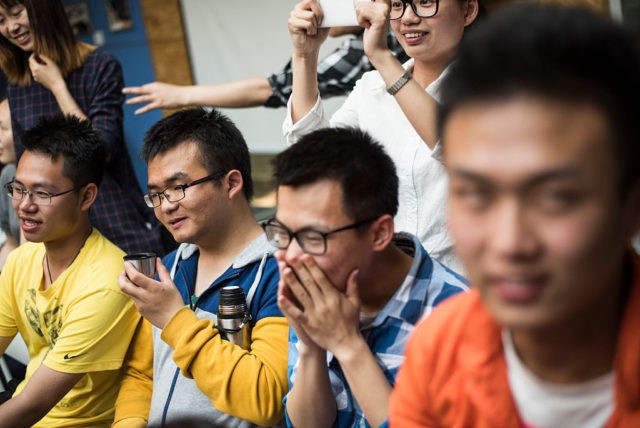In its latest attack on thriving Christian churches, China’s Communist party has issued an ultimatum to parents that if children do not stop attending church, they will be barred from attending college or entering the military.
Late last month, a local government office in the central Guizhou province sent a notice to all of the schools in the local area announcing the decision, in an effort to discourage citizens from attending independent house churches and to switch to a church under government control.
The unbending policy of the ruling party has insisted on government dominion even over personal matters such as faith and family size.
Government personnel have coerced members of the Huaqiu Church into signing a document stating that they would no longer take minors to church, China Aid reports. From now on, Christian children attending the church will no longer be eligible for the college entrance exam or admittance into a military academy. Moreover, parents who take their children to church will be sued.
Chinese law prohibits children under the age of 18 from receiving any religious education, and the colluding Protestant church, the “Three-Self Patriotic Movement,” explicitly bans its members from bringing their children up in the Christian faith, labeling the practice “brainwashing.”
According to Mou, the person in charge of Huaqiu Church, a government official said that the edict came down from Beijing’s central communist government and that local officials were just following orders.
The new policy excluding Christian students from a college education is part and parcel of a broader program of intimidation and control over the activities of Chinese citizens.
Last fall, Xinhua News Agency reported that China was “abandoning its decades-long one-child policy,” but human rights activists immediately noted that the Communist Party would never abolish its coercive population policy because it is central to maintaining the Party’s iron-fisted control over the lives of citizens.
“The Chinese Communist Party will never end coercive population control, because coercive population is keeping it in place,” prominent women’s rights activist Reggie Littlejohn told Breitbart News.
Ms. Littlejohn, president and founder of Women’s Rights without Frontiers, insisted that the apparent change in policy was merely cosmetic, since “terror is the purpose of the Policy.”
Littlejohn said that the Party’s coercive population control had become a necessary means to social control, “masquerading as population control” and thus would never be abandoned.
In fact, China’s “family planning” policies go hand-in-hand with the absolute control exercised by the Communist party over virtually every sector of public and private life, from religion, to education to trade unions and voluntary associations.
The Communist Party has reason to fear the rapid growth of the Christian church, which now outnumbers membership in the Party itself.
The Chinese Communist Party is the largest explicitly atheist organization in the world, with 85 million official members, but is now overshadowed by over 100 million Christians.
Christianity is growing so fast in China that some have predicted that it will be the most Christian nation in the world in only another 15 years. By far, the greatest growth is coming outside the official state-sanctioned churches, which kowtow to the Communist Party. The churches experiencing the most growth are the unofficial Protestant “house churches” and the underground Catholic church, which explains why Beijing is so anxious to suppress them.
“By my calculations China is destined to become the largest Christian country in the world very soon,” said Fenggang Yang, a professor of sociology at Purdue University and author of Religion in China: Survival and Revival under Communist Rule.
On paper, the People’s Republic of China recognizes freedom of religion since 1978, but party members are explicitly forbidden to believe in any religion. In 2011, Zhu Weiqun, executive vice minister of the United Front Work Department, wrote, “Party members shall not believe in religion, which is a principle to be unswervingly adhered to.”
In its annual report for 2016, the U.S. Commission on International Religious Freedom (USCIRF) noted that over the past year, the Chinese government had “stepped up its persecution of religious groups deemed a threat to the state’s supremacy and maintenance of a ‘socialist society,’” adding that “Christian communities have borne a significant brunt of the oppression, with numerous churches bulldozed and crosses torn down.”
The USCIRF further said that 2015 was marked by the Chinese government’s “deliberate and unrelenting crackdown on human rights and dissent.”
As it has done every year, China lodged an official protest of the report, especially its status as a “country of particular concern” for its for its “systematic, egregious, and ongoing abuses,” a designation China has enjoyed without interruption since 1999.
“The Chinese government fully respects and protects its citizens’ freedom of religion in line with the law, and Chinese citizens enjoy the rights to full religious freedom in accordance with the law,” Foreign Ministry spokesperson Hong Lei said after the report’s release in May.
“The U.S. ignores this fact and releases reports repeatedly to distort and attack China’s religious policies and status. China firmly opposes the U.S. move and has lodged solemn representation to the U.S. side,” Hong said.
Follow Thomas D. Williams on Twitter

COMMENTS
Please let us know if you're having issues with commenting.